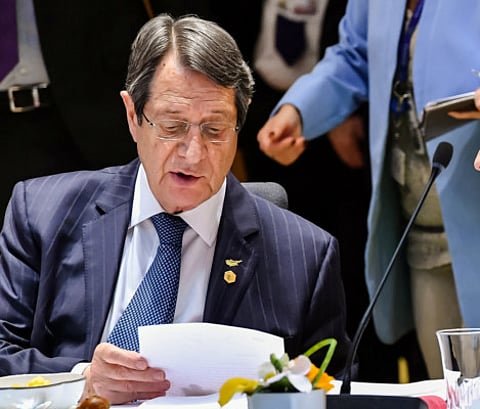Muddying the waters of the Mediterranean
Huge energy reserves off the island of Cyprus are sidetracking Turkey from joining the European Union

Whatever little hope remained that one day Turkey might indeed be allowed to become a fully paid-up member of the European Union (EU) has now been most likely fully extinguished for the foreseeable future over events now unfolding in the seas around the divided island of Cyprus.
Both Cypriots and Turks have been locked in mutual enmity since the island was divided north and south by the Turkish invasion of 1974, and intensive talks last autumn failed to break the deadlock in what remains Europe’s most vexed political question.
While tensions have risen and ebbed over the past four decades, right now there is palpable tension between Nicosia and Ankara. And at the centre of the dispute is the prospect of huge untapped reserves of both oil and natural gas under the sea floor of the eastern Mediterranean. They are enough to end Ankara’s imports on natural gas, and more than enough for Cyprus to finally shed the terms of a humiliating €10 billion (Dh45.21 billion) bailout it received in 2013 from the European Central Bank and the International Monetary Fund. The terms of that bailout meant that anyone with more than €100,000 on deposit in Cypriot banks lost their shirts.
Those potential oil and gas deposits — all of the initial testing and geophysical mapping suggests the fields are there and are economically viable — sit within the area of Cyprus’ Exclusive Economic Zone (EEZ).
Oil and gas aside, Cyprus’ economy is also pretty good right now, thanks to reforms that bailout ushered in, and a booming tourism sector also helps. Terrorism attacks and political uncertainty elsewhere have also been a boon to the island’s economy, which grew at 4 per cent in 2017 — one of the best performers across the EU.
If Turkey could get any share of those oil and gas deposits, it would be a feather in the cap of Turkish President Recep Tayyip Erdogan, helping to cut Ankara’s dependence on gas supplies from the Caucus mountains and Russia.
Ankara too is the main supporter of the Turkish Cypriot state on the northern portion of the divided island, and Ankara keeps some 35,000 troops stationed there — just in case.
Indeed, it was the presence of those troops that led in part to the breakdown of those autumn talks, with the Erdogan government digging its heels in.
But back to Cyprus’ Exclusive Economic Zone. That EEZ is recognised under the terms of the United Nations Convention on the Law of the Sea (Unclos). Turkey, however, is not a signatory to Unclos, in part because it maintains historical claims to Greek islands in the Aegean Sea and to the Turkish-Cypriot enclave.
When it comes to membership of the EU, Turkey would also have to settle any boundary, maritime or territorial claims with its neighbours — and would have to sign on to Unclos. Ankara also disputes part of the EEZ because of a claim it makes against a portion of the Mediterranean that is claimed too by Egypt. Besides, recognising the Cypriot EEZ would weaken its case of supporting the northern Turkish enclave on the island.
In February, Erdogan’s government sent Turkish warships to the disputed island to prevent an Italian energy company, ENI, from carrying out drilling operations. ENI had been commissioned by the government in Nicosia, and dispatching the warships was seen as a brazen act of brinkmanship.
Ankara argues the self-proclaimed Turkish republic of Northern Cyprus should also be allowed to exploit the offshore wealth, claiming that areas designated for drilling fall under Ankara’s maritime jurisdiction or that of the Turkish Cypriots. Naturally, huge oil and gasfields have the potential to reshape regional political alliances, and the United States and Russia are watching the situation very closely.
Last week, Erdogan announced that he was sending a drilling ship into the area to test the sea floor, and ExxonMobil too has a drilling and survey vessels there now.
President Nicos Anastasiades of Cyprus was re-elected last month for a second five-year term. It was he who had pushed the re-unification talks last autumn, talks that were the best chance so far of ending the 44-year division of his nation. He was re-elected on the hope too of kick-starting the talks once more, but the energy standoff has present a new challenge in bring both sides of the island together once more.
Even though the last round of talks did ultimately fail, they did manage to hammer out a compensation deal for the billions of pounds’ worth of property left behind by both sides when the island was divided. Some 380,000 acres of land were abandoned by Greek Cypriots as the island split along ethnic lines in 1974, while 110,000 acres that once belonged to the Turkish community is now in Greek hands. There are still ghost towns like Varosha — the once-exclusive beach resort frequented by Richard Burton and Brigitte Bardot which was abandoned after 1974 — and Morphou, a once predominantly Greek town of 18,000 now inhabited by Turkish Cypriots.
The sticking point to the talks was the 35,000 Turkish troops in the northern enclave. The Greek side has long demanded that all Turkish forces must withdraw as part of any putative deal, which would create a federally administered EU member-state, most likely with a revolving Turkish and Greek presidency.
Last autumn, in a series of notably positive statements, Erdogan said a deal would “contribute to the region’s security, stability and prosperity” and conspicuously did not rule out a Turkish withdrawal. But now with those oil and gas reserves entering the picture, that’s a sentiment that now seems remote — and President Erdogan is on no mood for compromise.


